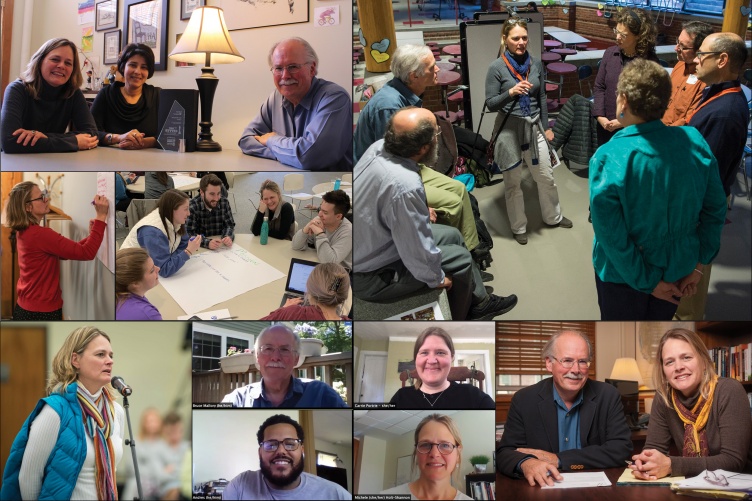
“We believe people should be involved in the decisions that impact their lives. So we help schools, municipalities—any public-facing entity—deepen the engagement that they have with the people they’re impacting,” she says, building steam. “We help make sure people have a voice in their community over the long haul.”
As the co-founder and director of New Hampshire Listens, Michele Holt-Shannon has facilitated meaningful discussions and shaped community decisions for more than a decade. Civic engagement is a cornerstone of public policy and Holt-Shannon helped found the initiative to help make that engagement as open and productive as possible. While her work has taken her to every corner of the Granite State, she can trace a line from her work today all the way to her childhood in Alabama.
“I'm a middle child: one of four. And I joke that that's the reason I got involved in dialogue and community conversation across differences. I just want people to get along!”
“I'm a middle child: one of four. And I joke that that's the reason I got involved in dialogue and community conversation across differences,” she says with a laugh. “I just want people to get along!”
Holt-Shannon, along with her many siblings, was raised in Tuscaloosa. While Brown v. Board of Education had been decided decades before she ever entered a classroom, Alabama remained a deeply segregated state. Some of the other white families she knew sent their children to private institutions instead of an integrated public school. However, Holt-Shannon attended a majority-black high school, where issues of race and the difficult conversations around it left a deep impression.
She stuck close to home for college, graduating with a degree in psychology and biology at the University of Alabama in 1989. From there, Holt-Shannon dove straight into grad school at Bowling Green State in Ohio where she turned her attention to education. Studying higher ed with a focus in student affairs, she also worked on programs to help undergraduates with university life.
“I worked with another grad student [and we] used theater to prompt conversation about things like sexual assault, or sexual orientation, or drinking too much, or whatever issues college students needed to talk about.” The skits and written prompts helped students open up, starting useful conversations that otherwise might not have happened. “I really learned a lot during that time.”
She received her master’s degree in 1991 and took the first step in a long career in higher ed that summer when she joined the staff at St. Bonaventure University. Holt-Shannon spent two years there as a social action program coordinator, further developing her skills in leadership and mediation. From there, she made the jump to the University of New Hampshire, where she has been ever since. Holt-Shannon’s first role was as the assistant to the director of residential life, a position she maintained while also pursuing a second master’s degree, this time in theological studies at Boston College. Her study of world religions gave her further glimpse into the need for conscientious conversation around sensitive issues, especially in heterogeneous communities.
Holt-Shannon completed the degree in 1997 and three years later began a new role at UNH as the assistant director of student life. While working with undergraduates in Durham, she found herself drawn into complicated discussion and conflict resolution.
“I ended up always being connected to the places where there was contention and strife… I went for the more serious stuff. That's when I got exposed to information on conversation and social equity.”
“I ended up always being connected to the places where there was contention and strife… I went for the more serious stuff. That's when I got exposed to information on conversation and social equity.”
Holt-Shannon’s interest deepened throughout her time working in the administration. In 2004, she was named UNH’s new administrative director of discovery and first year programs, a position she would hold for the next decade. As part of the team that oversaw major changes to the core curriculum, she took part in innumerable conversations between colleagues who had different visions on the project, which would provide the foundation for future UNH educations. The decisions were vital and needed buy-in from everyone involved.
Success during that experience helped Holt-Shannon to start talks with Bruce Mallory, Provost of UNH at the time, and Lou Feldstein, then president of the New Hampshire Charitable Foundation. Over lunch in 2010, they discussed the state’s proposal to legalize certain forms of gambling.
“[Mallory] was basically like what would it take to have conversations all over the state on whether or not New Hampshire should have casinos and gambling?” The trio worked with the Governor's Commission on Expanded Gaming and got their project off the ground. They called the venture What's at Stake and initiated conversation in a dozen locations across New Hampshire. “It was just fascinating to do the work and share this mix of thinking.”
 In the end, gambling was not expanded and Holt-Shannon was deeply satisfied by the impact they had achieved in ensuring all voices were heard. From the success of What’s at Stake, New Hampshire Listens was born. Founded on the principles of communal decision-making and civic engagement, NH Listens helps residents have discussions and work together to build fair communities for everyone. In 2013, Holt-Shannon left her old job in the administration and became full time director of the initiative, which found a home at the Carsey School of Public Policy.
In the end, gambling was not expanded and Holt-Shannon was deeply satisfied by the impact they had achieved in ensuring all voices were heard. From the success of What’s at Stake, New Hampshire Listens was born. Founded on the principles of communal decision-making and civic engagement, NH Listens helps residents have discussions and work together to build fair communities for everyone. In 2013, Holt-Shannon left her old job in the administration and became full time director of the initiative, which found a home at the Carsey School of Public Policy.
Holt-Shannon teaches a handful of courses at Carsey, but spends most of her time fostering guided, productive dialogue over all kinds of issues and decisions. Over the first decade of NH Listen’s existence, these matters have ranged from community-police relations to government transparency, lead safety, youth programs, and alcohol use. The impact isn’t always easy to appreciate: healthy communication in a community is just as vital a piece of infrastructure as roads or bridges, just not as visible. Occasionally however, Holt-Shannon gets to see her hard work come to life in tangible ways too.
In 2014, NH Listens helped bring the city of Dover together to discuss how their education system could best reflect the city’s values, including plans for building a new high school. Holt-Shannon ended up writing a report for the municipal government which highlighted the residents’ displeasure at the common practice of cordoning off career and technical education away from other subjects.
Years later, at a different Dover community meeting, a woman approached her.
“She says to me ‘I'm one of the architects of the high school and your report changed how we designed the school.’ Instead of the C.T.E. programs being in some separate section of the school, it was built with them in each corner of the school. They're integrated into the building itself,” she says, reveling in the memory. “It's fun to hear about that kind of concrete impact.”
New Hampshire Listens itself does not take a stance on any given solution, so Holt-Shannon sees success not as getting to any specific outcome, but rather when the process itself is open, respectful, and fair to all. In the current political climate, that’s not always easy. However, after more than a dozen years of making a difference, Holt-Shannon sees a bright future for NH Listens.
“It has gotten harder, as you might imagine. But my hope is that we can keep showing up and helping communities solve problems, deepen participation, and pay attention to real fairness and opportunity for everybody.”
Reported by Benjamin Scott Savard ‘23
















































